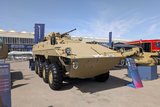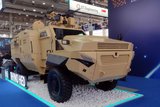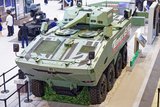BAE delivers first tranche of Austrian BvS10s
BAE Systems has delivered the first four BvS10 all-terrain vehicles to the Austrian armed forces, the company announced on 25 February.
The vehicles will be fielded by the Austrian armed forces’ 24th Infantry Battalion, a battalion of the 6th Mountain Infantry Brigade, which plays a leading role in the European Union Mountain Training Warfare Initiative, and the 2nd Engineer Battalion, which can provide combat support in mountainous terrain.
The Austrian armoured personnel carrier (APC) variant of the BvS10 features a 360° observation camera system with six day/infrared cameras and displays in the front and rear of the cabin. The vehicles are fitted with remote controlled weapon station, which is foldable to allow for swift transportation in the field.
The BvS10 support operations in challenging terrains such as mountains and snow to transport personnel or cargo in combat and disaster relief scenarios.
Mario Kunasek, Austria’s Minister of Defence, said: ‘The ‘Hägglunds’ is the first combat vehicle for the mountain infantry, which makes possible the armoured transport of soldiers in Alpine operations and off-road. We thus put renewed focus on our core task of military defence.’
BAE Systems is under the contract, awarded in 2016, to deliver 32 of the APC variant of the BvS10 to the Austrian armed forces.
More from Land Warfare
-
![World Defense Show 2026: ST Engineering’s Rhino 4x4 set to enter service]()
World Defense Show 2026: ST Engineering’s Rhino 4x4 set to enter service
The Rhino 4x4 protected vehicle is being manufactured for an undisclosed country, likely to be Singapore, while its Agil counter-UAS C2 system is in low-rate production.
-
![World Defense Show 2026: Saudi Arabia’s record defence spend highlights uncertain times]()
World Defense Show 2026: Saudi Arabia’s record defence spend highlights uncertain times
Saudi Arabia’s investment in its land forces, notably in the area of air defence as recently as 30 January, is a sign of the challenges the Gulf State faces, particularly the threat from Houthi rebels in Yemen.
-
![Singapore Airshow 2026: ST Engineering’s Terrex s5 highlights hybrid power’s role in future warfare]()
Singapore Airshow 2026: ST Engineering’s Terrex s5 highlights hybrid power’s role in future warfare
Hybrid-electric drive technology may address the growing energy demands of land warfare in future.























